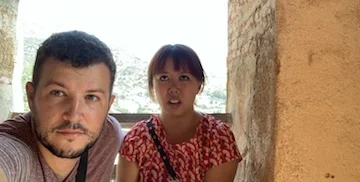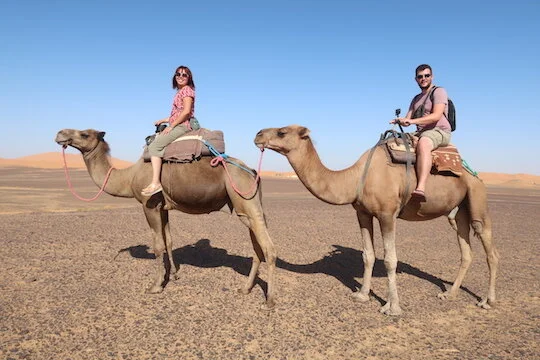They Eat... Morocco (The Bad News)
Whenever I get asked, “so do you want the good news or the bad news?”, I always answer, “the bad first, of course, I want to end on a positive note.” In this two part blog, I will share a honest recollection of our time … starting with the bad news. If you don’t want to read this, feel free to skip ahead to the good news by clicking on this link.
In one of our weekly e-mails to subscribers, we mentioned Morocco being a country of extremes. You could easily book yourself a private driver/guide for the entirety of your trip and only see all that is glamorous about Morocco: enjoy a couscous dinner on a riad’s rooftop (aka family homes converted into hotels), camel ride in the Sahara Desert, or drink nearly five bottles of wine with a four course lunch sitting right next to the grapes at a vineyard. We traveled on our own, but we did get to enjoy these three experiences.
We tried to live as locals. We stayed mostly in Airbnb homes, walked as much as possible and relied on google maps or Ian’s general sense of direction to get us places. If a public bus wasn’t available, we negotiated rates with taxi drivers (even though they should use the meter). I will not sugarcoat it because it just wouldn’t be fair to you, especially if you are considering Morocco as a travel destination. Too many of my friends who heard some of our stories responded in shock: “but everything on the internet shows it to be this exotic, amazing place!”
“Man Culture”
Many blogs warn women traveling to Morocco of the patriarchal and conservative culture which exists in this predominantly Arab and Islamic country. Unfortunately, this is the reality. Women are expected to wear loose clothing covering their shoulders and their knees. This was not easy when it was regularly 90+ degrees Fahrenheit. You may choose not to adhere to this local custom, but you are likely to get many looks as you walk down the street. The only exception seemed to be Marrakech where the city is more modern and liberal. But, it was also here that we saw a man grab a random woman on the street quite inappropriately. We read that tighter clothing will make it seem like you are inviting this type of attention.
As we were walking down the streets, we noticed cafes on every street. Chairs are placed in horizontal rows facing the street. They are busy all the time. It was always only men – just looking out at the streets chatting but not necessarily looking at each other. This didn’t matter whether it was day or night. A local we met shared that it is frowned upon for women to go to cafes. They will be seen as not marriage material. Someone even told us these women are sluts coming to pick up men. This was said very a matter a factly. I never noticed any foreigners sitting at the cafes either, so Ian and I never felt comfortable going for a mid-day caffeine break. Who knew going for a mint tea would essentially brand a women?
Accusations First…
The Moroccans hate having their photo taken. We were always very careful not to do so without their permission. But if you even have your camera slightly in their direction, you will immediately get yelled at, usually in Arab or French. It isn’t, “do not take a photo of me!”. It is, “stop taking a photo of me, how dare you do this, who do you think you are, you are so rude..” etc etc. How do I know this? Well because we had times where we with a local and he would apologise to us on behalf of his people. This even happened to Ian and I at a restaurant inside Casablanca Airport. After 25 days of challenge, I finally broke down and actually cried. What do you think happened? Well… he just kept on yelling at me. I was convicted guilty.
Similarly, I already mentioned above how unacceptable it is for women to go to cafes. Well, it is actually illegal in Morocco for a man and woman who are not married to live together alone. We met a local who left Islam eight years ago. He lives with a foreign woman, enjoys alcohol, and takes care of volunteer cats. We met another local who manages a wine vineyard but is still a practicing Muslim (drinking is not allowed for Muslims). Both of them shared how family and friends call their lifestyles “haram” meaning forbidden. They are told they will go to hell. They told me, “so I will go to hell. I need to live my life.” I admired their courage to be their true selves, despite not only societal pressure, but judgement from people they love and care about.
All About the Hustle
In the medinas, you will constantly get people volunteering to show you the way. If you say yes, you may or may not get taken to where you want to go. But you definitely will be expected to hand over money for their efforts. If you do not give any or not enough, you will get yelled at. While I am mentioning medinas, do not buy a tagine pot at a medina. Most if not all of these are actually made with lead! This was repeatedly warned to us by every local guide who heard of our interest in cooking with one.
A couple we met shared their story of a tour guide booked via their hotel. The guide was supposed to spend half a day showing them around the local medina. Instead, they were taken to every possible store for shopping. The tour ended up being a full day and they got charged for it. You can already imagine the amount of commission the guide also received from all the stores. When they gave feedback to the hotel, the guide went to them in the morning to confront them about it. Awkward….
Most taxi drivers will charge you at least two times the typical price, but most of the time, we experienced them trying to charge 4-5 times what the meter should be. We would ask for the meter and they would just refuse. It was 11:00PM after dinner one night and our restaurant called us a taxi. We thought he would be more honest, but no, we got in and he charged us four times the price. Given how late it was, we reluctantly accepted it.
I was really craving a kebab during our last day in Marrakech. We went to a local place near our Airbnb. The conversation was in English and the waiter spoke it fluently. I ordered a normal size kebab with no fries and no drink. Another waiter kept repeating, “it has to come with fries”. The first waiter shut him down in Arabic (and hand gestures), then told us the order was no problem. He repeated the order back to me and then pointed at a wrap, asking, “is this size good?”. I said, yes sounds great. We waited about ten minutes for them to make it. The second waiter says, “here is your order, large size and it has to come with fries like I told you.” He is instantly frustrated by my “this is not what I ordered” response and goes to find the first waiter who disappeared inside. The first waiter comes out and says to us, “I asked you if you wanted this size wrap and you said yes – that’s the big one.” We are even more frustrated now and I replied, “you confirmed my order then pointed at a wrap which I assumed is the normal once since you didn’t show me another comparison point. You are trying to cheat us!” He then said, “that is what you wanted and it is large. You ordered that. But fine, I will go get another one made.” It wasn’t even just getting the order wrong, but to accuse us of being at fault here. All for the difference of 20 Dirham (2 USD) versus 48 Dirham (5 USD). I could have just bought the large one, but I felt that is exactly what he wanted to have happen and so, we walked away. I was kebabless.
Where is the alcohol?
Other than in Marrakech, we had huge difficulties finding places to purchase alcohol. In Tangier, we went to the London Pub after our tough day visiting Asilah. When we got there, they refused to let us in because Ian was wearing shorts. When we mentioned this to a local, he said that we should have given some money and then they would let us in. It was near 100 degrees that day and I was already sweating in my clothing attire. Feeling defeated we just went home.
There are a couple off-license places next to supermarkets but they are closed on Sundays. In Fes, this required us taking a taxi to a large shopping mall as there aren’t any small shops that would sell alcohol.
For an alcoholic beverage with a meal, then you need to find a restaurant that serves international food. If it is Moroccan, then there is no alcohol. If it is international, it is usually expensive. If you go to Morocco during Ramadan, even hotels are not supposed to serve alcohol. So make sure to check your calendar!
We found all of this especially interesting when we visited the vineyard in Meknes. There we learned that they produce 400,000 bottles per year and 80% of it is sold in Morocco. This only one of many vineyards scattered throughout Morocco. So then… where is all this wine when we wanted to buy it?
The Good News
If you made it to the end of this blog without feeling like I have killed your every desire to venture out to Morocco, please do click here and read all the best of Morocco. Yes, it was tough, but we cherish this time and experience. We learned so much about the culture, its people, and there are many great things about it making the challenges worth it.






